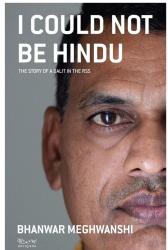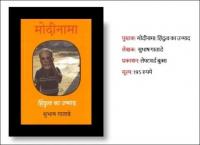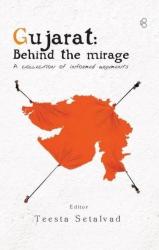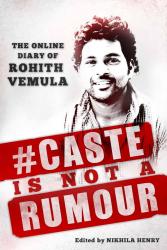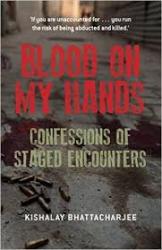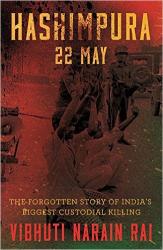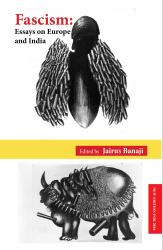Summary: आज संविधान निर्माता बाबा साहेब डॉ भीमराव अंबेडकर का महापरिनिर्वाण दिवस है,बाबा साहब ने अपने लेखन में सामाजिक विषमता के कारक तत्वों की खोज करते हुए पाया था कि हिन्दू धर्म एक चार मंजिला इमारत है,जिसमें सीढ़ियां नहीं है,जो जहां जन्मता है,वहीं मरता है।उन्होंने कहा कि इस धर्म में पैदा हो जाना मेरे बस की ब
राजनीती
Summary: मोदीनामा : हिंदुत्व का उन्माद
लेखक : सुभाष गाताडे
प्रकाशक : लेफ़्टवर्ड बुक्स, 2254/2 ए, शादी खामपुर, न्यू रंजीतनगर, नई दिल्ली – 110008
ISBN 978-81-940778-5-5
क़ीमत : 195 रुपये
लेखक : सुभाष गाताडे
प्रकाशक : लेफ़्टवर्ड बुक्स, 2254/2 ए, शादी खामपुर, न्यू रंजीतनगर, नई दिल्ली – 110008
ISBN 978-81-940778-5-5
क़ीमत : 195 रुपये
Summary: A Collection of Informed Arguments
Edited by Teesta Setalvad
publisher: The Book People
ISBN: 9789383756124
Edited by Teesta Setalvad
publisher: The Book People
ISBN: 9789383756124
Summary: #Caste is not a rumour: The online diary of Rohith Vemula is a collection of Mr. Vemula's online writing. The book, which is over 40,000 words, includes most of his Facebook posts. The books carries his views on a gamut of issues including politics and academics.
Summary: Book Review
Blood on my hands: Confessions of staged Encounters
Blood on my hands: Confessions of staged Encounters
Summary: Searching for survivors among the blood-soaked bodies strewn around the canal and between the ravines near Makanpur village, on the Delhi–Ghaziabad border, on the night of 22 May 1987, with just a dim torchlight—the memories are still fresh in Vibhuti Narain Rai’s mind. On that fateful night, when Rai first heard about the killing, he could not believe the news was true until he, along with the district magistrate and a few other officials, went to Hindon canal. He quickly realized that all of them had become witnesses to secular India’s most shameful and horrendous incident—personnel of the Provincial Armed Constabulary (PAC) had rounded up dozens of Muslims from riot-torn Meerut and had killed them in cold blood in Rai’s area of jurisdiction. Offering a blow-by-blow account of the massacre and its aftermath, Hashimpura is a screaming narrative of the barbaric use of state force and the spineless politics in post-Independent India.
Summary: In Arab countries, openly declaring a disbelief in God is a shocking and sometimes dangerous thing to do. Many have been imprisoned for it, some have been forced into exile and others threatened with execution.
Summary: The victory of fascism in Europe between the wars was an incalculable human catastrophe. This collection of essays contains the first-ever English translation of Arthur Rosenberg’s fascinating analysis of the emergence of fascism in Europe, as well as a short introduction to the essay that explains its significance, and then four contributions that extend the framework to India – dealing in turn with Savarkar and the politics of the Hindu Mahasabha (Srinivasan), communalism as the Indian version of fascism and its roots in the majoritarian ideologies of the nation-state (Simeon), and the fascism of the Sangh Parivar as this had emerged by the early ’90s when concerted communal mobilisations unleashed a spate of violence, foreshadowing the even more horrific events of 2002 (Sumit Sarkar). Unlike most left-wing theories of fascism, Rosenberg’s work made the mass base of fascism central to its political success.
But what does it mean for fascism to have a “mass base”? And how does it construct one? The concluding chapter explores the notion of “passive complicity”, using ideas developed by Jean-Paul Sartre in his major work Critique of Dialectical Reason, and then turns to a characterisation of the Extreme Right in India by looking at the strategies at work in the subversion of Indian democracy.
But what does it mean for fascism to have a “mass base”? And how does it construct one? The concluding chapter explores the notion of “passive complicity”, using ideas developed by Jean-Paul Sartre in his major work Critique of Dialectical Reason, and then turns to a characterisation of the Extreme Right in India by looking at the strategies at work in the subversion of Indian democracy.
- 1 of 3
- ››




